E-Scooters: Are they helpful or getting in your way?
- Published
- comments
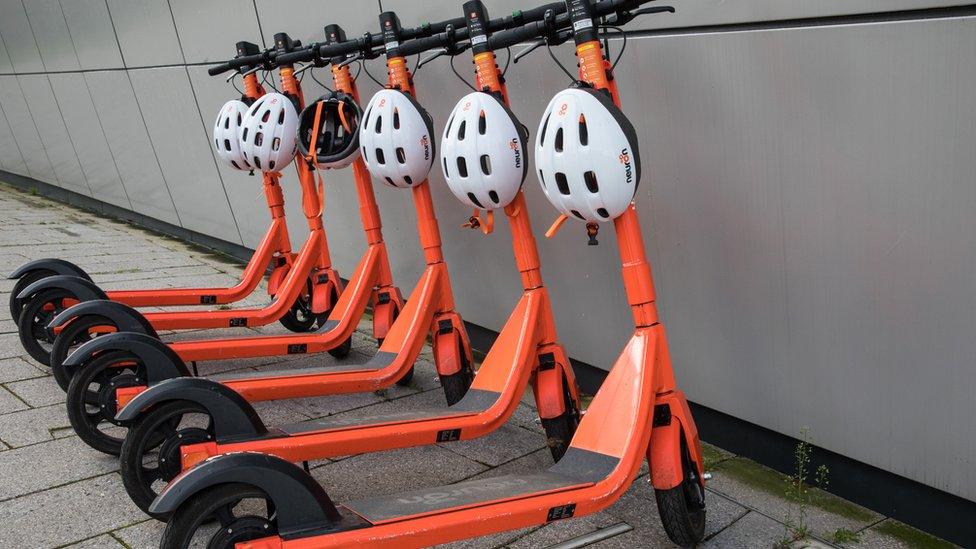
Have you noticed a sudden increase in people whizzing around your town on electric scooters? Well, you're not alone! Rental e-scooter schemes now operate in more than 100 cities around the world.
And getting from A to B on an e-scooter is set to become much more popular as the government wants to find greener ways of travelling.
However, while these convenient vehicles might be a friend to the environment, some are causing problems for pedestrians and wheelchair users after being dumped in the middle of pavements after use.
Has your path been blocked by an e-scooter? Or do you think these carbon-neutral scooters are the future of green travel? Let us know in the comments below.
What are the rules?
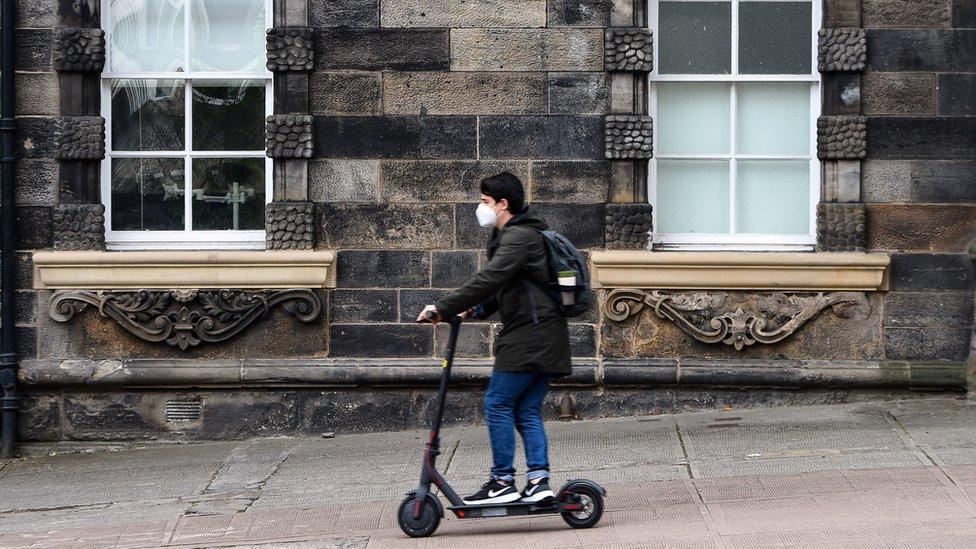
What are the rules around the new method of getting around?
Last year the government began a 12-month trial of e-scooter rental schemes across the country. It's part of a £2 billion plan to invest in greener travel and also a way to reduce the amount of people on public transport to maintain social distancing during coronavirus.
Users simply download an app and scan it on the handlebars to activate the scooter, which can be used on public roads, cycle lanes and bike lanes. They are not allowed on pavements or motorways.
The hired vehicles are classified as motor vehicles which means the same traffic rules apply to driving a car. E-scooters can be used within set boundaries in each area and the maximum speed is 15.5mph.
You have to be 16 years or older to hire an e-scooter and must have a full or provisional car, motorcycle or moped licence.
The government recommends users wear a helmet when using an e-scooter, but it's not a legal requirement.
These rules cover rented e-scooters only. Using a privately owned e-scooter on a public road, path or bike lane is illegal.
The government says it will monitor safety and keep the year-long scheme under review.
Supporters say there will be fewer cars on the roads as some people will choose to use e-scooters instead - and that will mean fewer traffic jams and less pollution from car fumes.
Don't get confused with regular non-electric scooters though - rules for them haven't changed so enjoy using yours if you have one.
What are the problems with e-scooters?
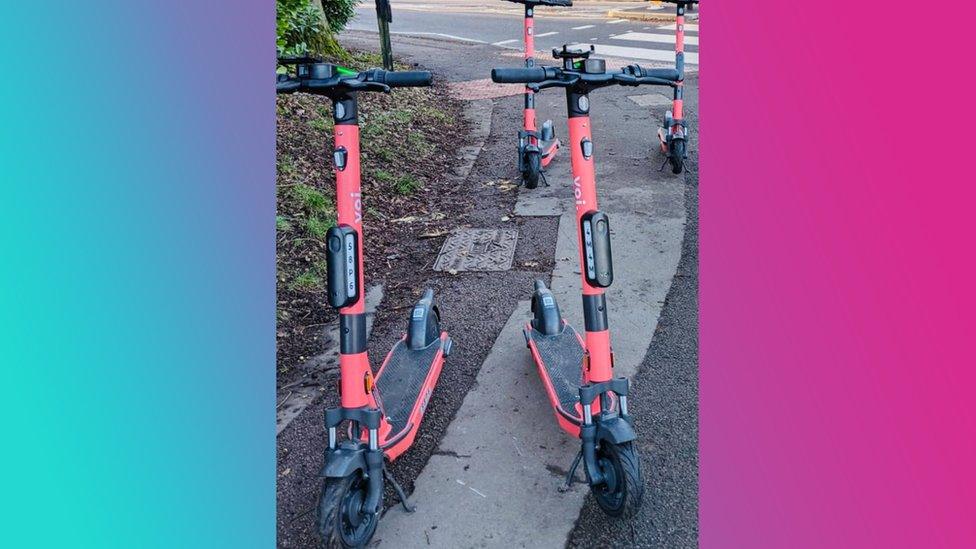
Oxford Councillor Tom Hayes posted this photo on social media saying he has been "hearing a lot of concerns about the abandonment of eScooters on our streets and how they're blocking pavements"
E-scooters have set parking areas where they should be collected and returned to. However, not all users are leaving them in the correct place and are abandoning them after use.
There are also concerns over the safety of e-scooters due to their speed and because they make hardly any sound so it's difficult to hear them approaching.
The Royal National Institute of Blind People has called them a "real and genuine threat to blind people".
Some are also worried about accidents involving e-scooters not being ridden or parked safely. Researchers at the University of California found that hospital admissions involving e-scooters more than doubled between 2014-2018 in the US.
Some e-scooters have only a single brake, which makes stopping safely more difficult.
What did e-scooter companies tell us?
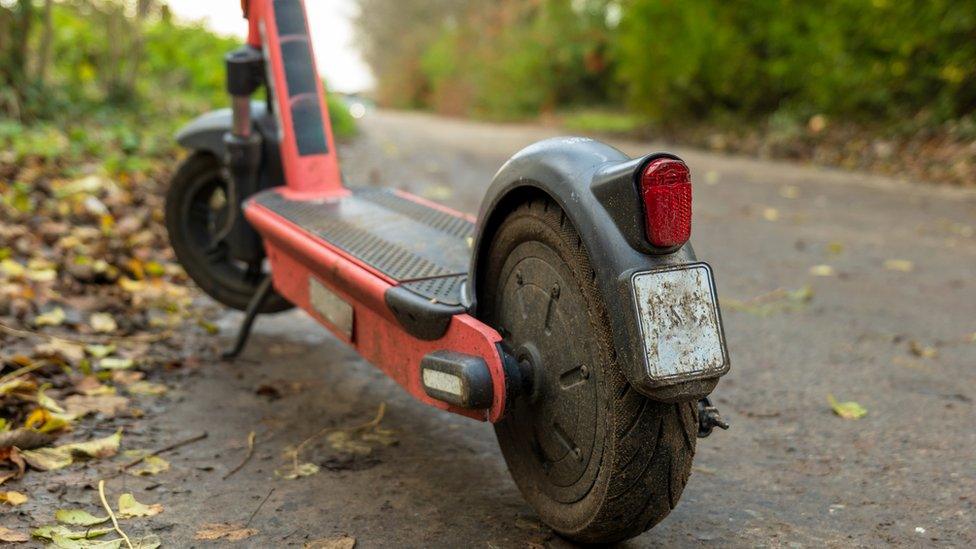
This e-scooter was left on a pedestrian footpath
TIER
In December 2020, Europe's largest e-scooter operator TIER launched a UK & Ireland Safety Board to try to raise safety standards across the industry in an attempt to stop "the risks that e-scooters can pose to cities".
A spokesperson for TIER, who operate a scheme in York, told Newsround: "We take e-scooter safety extremely seriously and aim to ensure that all of our users ride responsibly. We offer clear in-app guidance on the safe and proper use of e-scooters before users can even register, including how to safely ride our e-scooters alongside other road users and vulnerable communities. We also launched our Ride Safe School in partnership with the AA's DriveTech, which offers bespoke e-scooter training including access to the first ever e-scooter theory test.
"We recognise that parking is one of the most common issues raised and have introduced several initiatives to tackle these issues. For example, working with local councils and our charity partners representing people with visual impairment, we identify and mandate specific parking zones that are highlighted by physical signage. These dedicated spots mean that e-scooters are parked responsibly 99% of the time. Any abandoned e-scooters are picked up immediately by our street patrol team, who operate physically and are available via phone 24/7. Residents or visitors in York are also encouraged to report misparked or misused scooters directly to the York team."
Lime
Lime operate e-scooter hire schemes in Salford, Milton Keynes and Rochdale.
Alan Clarke, Lime's Director of Policy and Government Affairs, Northern Europe told Newsround: "E-scooters give adults an easy to access, affordable and clean way to travel without using cars. At Lime, we educate our users to ride safely and park responsibly, and have a team of people to move any of our scooters as needed. We also invest in technology solutions to make parking easier.
"Our scooters are a new and exciting way to travel, and we're working hard to make sure they're introduced safely and benefit everyone."
Wind
Wind Mobility, who is running e-scooter schemes in Nottingham and Derby, told Newsround: "We educate our users on safe and responsible riding as well as local traffic and parking rules through our social media channels and the Wind app. i.e. We ask users to wear a helmet and to not ride on pavements on our Wind app before their first ride.
"The e-scooter rental scheme is a trial of a new way of travelling for short, essential journeys. While we see a great demand for and acceptance of the new e-scooter scheme, some issues will emerge as with any trial. Wind Mobility is working to address these, with the support of Nottingham City Council, to improve the experience for our riders, and also people living, working and travelling in Nottingham."
Voi
Voi has e-scooter hire schemes in over 15 locations across England. They told Newsround: "According to the data we have the vast majority of our users (97%) parks the scooters correctly. Our e-scooter speeds are capped at 10mph, so people get used to riding rental e-scooters. This is well below the 15mph recommended by the Department of Transport.
"Voi is the first e-scooter operator to deploy e-scooter parking racks in the UK. Dedicated public parking spots have a significant positive impact on parking behaviour. The findings show that parking infrastructure improves access by 81%. In Oxford, we have just announced a pilot with a London based software company called Captur to improve accessibility and mobility for all.
"As part of Voi's operations, a team of Voi ambassadors patrols the operating e-scooter zone and adjusts and corrects any incorrectly parked e-scooters that they come across. In addition, Voi works closely with the local police, and the company has a three strike policy (at the 3rd strike, users are blocked) to ensure riders comply with the e-scooter regulations. Riders who do not comply will have their accounts blocked, and they won't be able to ride a Voi scooter anymore."
Bird
Bird e-scooter company also operates in the UK. They told Newsround: "Bird provides robust in-app training for its riders which they have to go through before being able to ride. Bird also carries out in person training regularly in the cities we operate in. When signing up to Bird you have to agree to our terms and conditions which include responsible riding and parking. Antisocial riding and parking is not tolerated and riders can be banned from using our service or fined if they do not adhere to our policies. The rules around riding electric scooters are very clear, and Bird rarely receives complaints of poorly parked scooters.
"Bird has a number of things in place to prevent poor parking. In Canterbury for example scooters can only be parked in pre-approved parking spaces. It is not possible to end a trip and park the scooter if it is not in an approved parking space."
Let us know what you think in the comments!
- Published8 December 2020
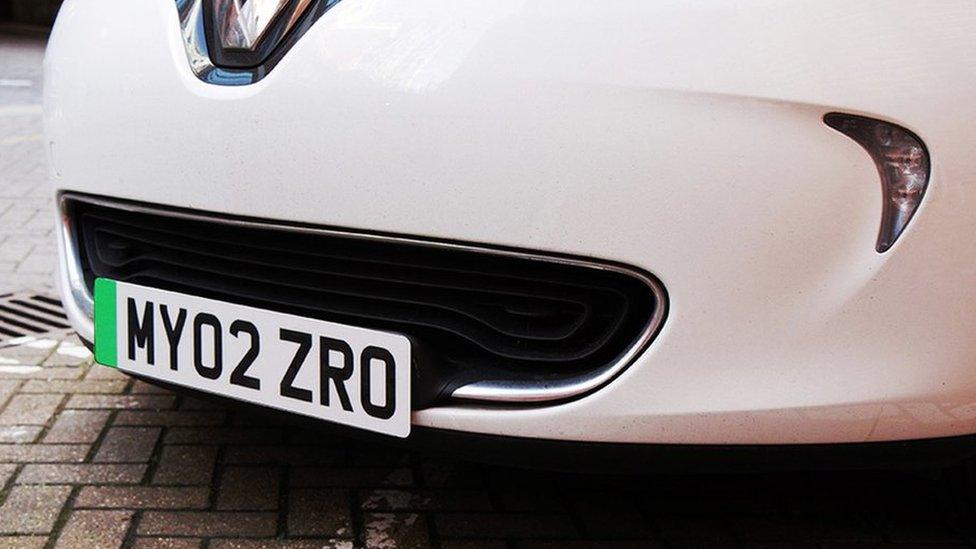
- Published1 July 2020
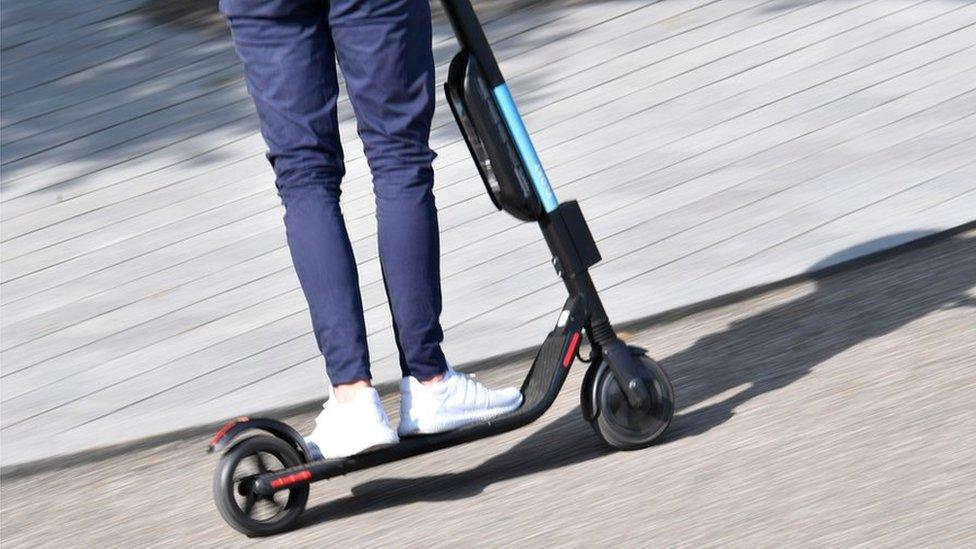
- Published17 November 2020

